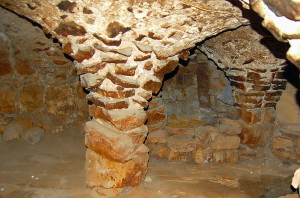Taybeh is a small Christian town in Israel’s West Bank, a few miles from Jerusalem. A Palestinian house discovered near a Taybeh church has changed the way that many people understand an important part of the traditional Christmas story. The pregnant mother of Jesus might not have been turned away by a heartless innkeeper after all.
The small house in Taybeh has two rooms. The larger room is where the owner’s family cooks, eats and sleeps. An adjoining smaller room, accessible through a narrow door and up a couple of stairs, allows visiting relatives some privacy. Under the house, in a cave carved in the limestone, is a stable where the family’s few animals are kept. A feed trough or manger about the size of an infant lies along the stable’s back wall.
So what does this house have to do with the Christmas story? Scholars believe the Taybeh house is similar to houses common in first century Judea. The Greek name for the upper guest room is “kataluma,” the word that has been translated as “upper room” in English versions of Luke’s account of the Last Supper. English translators, having never seen a first century house, rendered the identical word “inn” in Luke’s story of the birth of Jesus.
Looking at the Taybeh house, a growing number of scholars believe Luke reports that Jesus was born in a stable under the house of a relative, either because the kataluma upstairs was filled or, more likely, was not considered an appropriate place for a birth. This interpretation aligns with the ancient tradition that Jesus was born in a cave. An unavailable guest room also seems more likely than an overcrowded inn in first century Bethlehem, a town both too small and too close to Jerusalem to support such a facility.
Some Bible translations now use “guest room” instead of “inn” as the place lacking room for Jesus’ birth. But when it comes to Bibles stories, traditions often trump scholarship. Don’t expect Christmas pageants to replace the innkeeper with a relative of Joseph gently leading Mary to the stable downstairs anytime soon.
